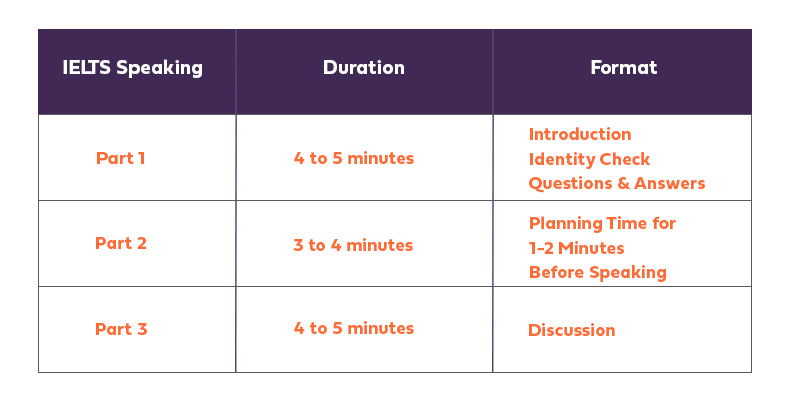
Do you intend to register for the IELTS test, or are you an aspirant registered for the IELTS test? Then obtaining a good score would be the best choice. Besides the writing, reading, and listening tests, we may feel challenged in speaking tests. It is because we might have time for thinking, but in speaking, we should speak spontaneously. If you want to enhance your English speaking skills, you can join IELTS Online Coaching and learn the IELTS speaking criteria, how to improve your speaking in IELTS, and phrases for speaking IELTS
IELTS Overview
The IELTS test assesses your proficiency in four areas: reading, writing, listening, and speaking.
You must decide which of the test modules—academic or general training—you will take based on the organization's specifications to which you are applying.
The Speaking part is the same for the Academic and General Training modules.
Getting started
Before you start preparing for the IELTS, you must understand how to prepare and how to improve your IELTS speaking. Your struggle would be half a won if you had a solid understanding of these, as it would give you a good notion of how to prepare, what to prepare for, and which areas you should spend more time on while preparing for the test. If you are eager to take the IELTS test, you can join the IELTS Coaching In Chennai which would help you understand the speaking test strategy and tips to overcome the speaking test with a high band score.
IELTS Speaking test format
The IELTS speaking test lasts 11 to 14 minutes. The exam is broken down into the following three sections:

IELTS speaking questions
The questions in each of the three sections are different to demonstrate the breadth of your language on varied subjects and in various response lengths.
IELTS speaking topics and different question kinds
Part 1
You can expect questions from familiar topics in part one of the speaking IELTS test. So, the aspirant who is preparing for the IELTS test must prepare on the general topics such as:
Part 2
You are given a topic or task card for this section and must deliver a talk or monologue for one to two minutes. You have one minute to prepare your speech before speaking. Make sure you use this minute well and prepare your topic in advance.
Topics in this card can be anything related to your family or personal. Sometimes about your experience also. Moreover, you can expect questions such as events, vacations, memories, or anything.
Part 3
The examiner will pose more abstract questions to you in this section. These queries are broadly and thematically related to the subject in part 2. Based on your knowledge and experience, you should answer.
An illustration of how the subject might be related to the task card:
Your favorite vacation spot Task
What significance do holidays have? How does tourism benefit a nation's economy?
Ensure the responses are lengthier than those in part 1 of the question. Make the most of this chance to demonstrate your ability in languages since it's also your only opportunity to do so.
IELTS speaking assessment criteria
For the IELTS Speaking test, there are four main evaluation criteria:
IELTS speaking band descriptor
Academic and general training has the same speaking assessment and band score. According to the four main criteria, speaking abilities are evaluated using the band descriptions as follows:
Every band level, from 0 to 9, has a detailed explanation of each assessment criteria. You can understand how candidates are evaluated in the Speaking segment of the test and how band scores are allocated to candidates by studying each of the four assessments at each level.
Let's examine what each of these categories entails.
Fluency & Coherence
Fluency
The ability to communicate for long periods without difficulty pauses or repetitions is referred to as fluency. To seem spontaneous and to convey the appropriate emotion, you must be fluent. It will make it easier for the listener to understand what you are saying.
Coherence
It describes how ideas grow logically while speaking, connecting within and between phrases. So, speaking fluently and following your thoughts is something the examiners check for. You can do this depending on how you use the right words and phrases to connect your ideas.
If you want to enhance your speaking skills, you can join Spoken English Classes in Chennai and improve your communication, pronunciation, and usage of vocabulary in speaking.
Lexical Resource (LR)
It alludes to the range of vocabulary an applicant utilizes. It would be best if you naturally used an advanced vocabulary, including uncommon words and idiomatic language, to achieve good test scores.
Grammatical range and accuracy (GRA)
You should use a range of grammatical structures to achieve a good IELTS Speaking score.
It won't be enough to "play it safe" using precise words that cover a small range to earn a good score. You might need to show that you can accurately use a good range of different grammatical constructions, such as:
-
Utilize the right blend of the simple, compound, and complicated sentences.
-
Use tenses, such as the perfect, future forms, and narratives
-
Employing models for many purposes
-
Using connectors and referencing to connect two or more ideas
-
Utilizing relative and subordinating clauses
-
Adjectives with comparative and superlative meanings
-
Utilizing the right active and passive voice
Pronunciation (P)
Accents should not be confused with pronunciation. You are not required to speak with a certain accent for the IELTS test. Instead, speak in a style that allows your audience to understand you without having to pay close attention to every word you say. There are several pronunciation characteristics, such as:
-
Applicant should use the correct phonemes(sounds)
-
Maintain the right tonality and accents slang
-
Give stress to the sentence while speaking.
-
Intonation(the rise and fall of the voice in speaking)
IELTS Coaching in Coimbatore meticulously designed the course syllabus for the Coimbatore- based students which would help them to obtain high band scores.
Tips to overcome the IELTS speaking test
-
Avoid fillers such as E.g. em, actually, the thing is, I'm trying to make it, what I mean is… etc.
-
Use connectors and phrases such as most importantly, on the contrary, furthermore, moreover, in addition, etc.
-
Make a list of phrases and try to use them while speaking.
-
Practice and record your speech for later evaluation
-
Hear your recording and if you have used repeated words, refer to the list of phrases you have created and use them in the next recording.
-
Avoid using repeated words.
-
Have the habit of getting feedback and checking whether your language flows out naturally in a balancing manner.
-
Try elaborately expressing your thoughts and ideas using nouns, vocabulary, and synonyms, which would help you replace the words you have used before.
-
Read newspapers and magazines to build your vocabulary.
-
Watch movies and series in English to improve your pronunciation.
-
When watching or reading, look for new words and their contexts, such as their meaning and collocations.
-
For typical IELTS topics, compile a list of terms and words, linking words for speaking IELTS and new words and their synonyms.
-
List the phrases for speaking IELTS, then use the words while speaking.
-
Group unfamiliar words about commonplace subjects and practice using them, for example, vocabulary for talking about hobbies, daily activities, food, etc. (include phrasal verbs and idioms as well)
So, before focusing on our IELTS speaking score, we must evaluate whether we have prepared well for the exam.
Now, you would have understood IELTS speaking band score and how to improve IELTS speaking. So, if you desire to get a high band score in speaking, reading, writing, and listening, you can join IELTS Coaching in Bangalore and enhance your speaking skills.